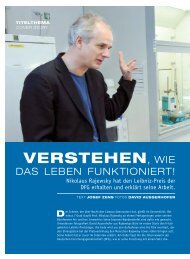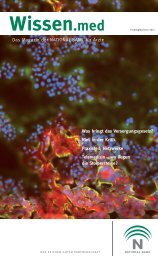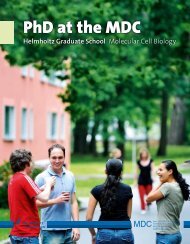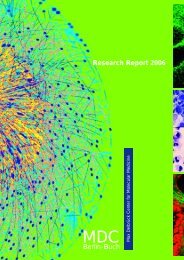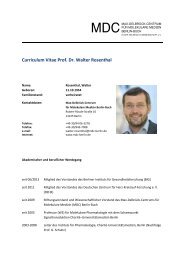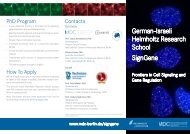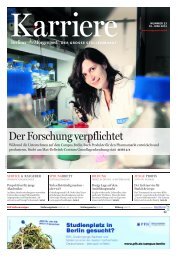Research Report 2010 - MDC
Research Report 2010 - MDC
Research Report 2010 - MDC
You also want an ePaper? Increase the reach of your titles
YUMPU automatically turns print PDFs into web optimized ePapers that Google loves.
Cancer <strong>Research</strong> ProgramKrebsforschungsprogramm Claus Scheidereit, Achim Leutz, Martin Lipp, Udo HeinemannAs a collective term, cancer denotes a variety ofmalignant neoplastic diseases that originatefrom different organs through the accumulationof multiple mutations in the genome. Thesealterations affect the functioning of sets of geneswhich control the normal behavior of cells in their tissuecontext. It is a shared feature of the differenttypes of cancer cells that they escape the natural surveillanceof growth control by their environment: cancercells proliferate in an uncontrolled manner, theyevade their elimination by natural cell death, escapethe control by the immune system and finally dispersein the body by migrating through the blood andlymph system (metastasis) to form secondarytumors.The objective of the Cancer <strong>Research</strong> Programis to understand at the molecular and cellular levelhow cancer develops and progresses in order to providethe basis for improved diagnosis and, ultimately,treatment of cancer.The human genome contains around 23,000 proteinencoding genes, a number of which are of particularimportance for the regulation of cellular behavior. Incancer cells, many of these crucial genes are repeatedlyfound to have acquired genetic mutations. Theseaffected genes are categorized as either “oncogenes”or “tumor suppressor genes”, depending on theirmode of action.They code for regulatory and structuralproteins that control critical processes, such as cellproliferation, differentiation, apoptosis, cell migrationor angiogenesis. Often, cancer cells have accumulatedsets of mutated genes for these different functions.Many of these genes are also active during embryogenesisor during the differentiation of distinct celltypes. This is why tumor cells appear to share characteristicsof embryonic cells.The research groups of the <strong>MDC</strong> Cancer <strong>Research</strong>Program work in the fields signal transduction andgrowth control, structural genomics and tumorimmunology. The broad expertise in basic biomedicalas well as clinical disciplines allows to investigate thecauses and the emergence of cancer and to findrational treatments. Cancer studies are conducted inclose collaboration with clinical research groups ofthe Charité/ Medical Faculty Berlin. The aim of theProgram is to discover and to characterize genes thatAls Sammelbegriff bezeichnet Krebs eine Bandbreiteunterschiedlicher, bösartiger Tumor-Erkrankungen,die in verschiedenen Organen des Körpers durchAnhäufungen von Mutationen im Genom entstehen können.Diese Mutationen verändern die Funktion von Genen,die das normale Verhalten der Zellen in ihremGewebsverband steuern. Eine gemeinsame Eigenschaftder Zellen verschiedener Krebstypen ist, dass sie sich dernatürlichen Wachstumskontrolle durch ihre Umgebungentziehen. Krebszellen teilen sich spontan und unreguliert,entgehen dem natürlichen Zelltodprogramm und derAbwehr durch das Immunsystem und können denZellverband über Blut- und Lymphkreislauf verlassen, umsich an anderer Stelle als Metastasen anzusiedeln. ImForschungsprogramm des <strong>MDC</strong> soll auf molekularer undzellulärer Ebene verstanden werden, wie Krebs entsteht,um die Grundlage für eine verbesserte Diagnose undTherapie von Krebserkrankungen zu schaffen.Das menschliche Genom enthält etwa 23000 ProteinkodierendeGene, von denen eine Anzahl für die Steuerungdes Verhaltens der Zelle im Gewebeverband verantwortlichist. Viele dieser Gene finden sich regelmäßig in mutierter,also genetisch veränderter Form, in Krebszellen wieder.Diese Klasse von Genen wird begrifflich, entsprechend ihrerWirkungsweise, in „Onkogene“ (potentiell krebsfördernd)und „Tumor-Suppressor-Gene“ (potentiell krebshemmend)eingeteilt. Alle kodieren für Proteine, die eine Funktion inder Steuerung von Prozessen wie Zellproliferation, Zelldifferenzierung,Apoptose, Zellmigration oder Angiogenesehaben. Krebszellen weisen häufig Mutationen mehrerersolcher Gene auf. Viele dieser Proteine sind normalerweisewährend der Embryogenese und ebenso später bei derRegeneration bestimmter Zelltypen aktiv. Deshalb habenTumorzellen auch zahlreiche Eigenschaften mit embryonalenZellen gemeinsam.Die Forschergruppen des Krebs-Forschungsprogramms des<strong>MDC</strong> arbeiten auf den Gebieten der Signalübertragung,Wachstumskontrolle, Strukturbiologie des Genoms undder Tumor-Immunologie. Experimentell-theoretische undklinische Expertisen werden systematisch eingesetzt, umdie Ursachen und den Entwicklungsverlauf von Krebs zuverstehen und zielgerichtete Therapien zu entwickeln. DieStudien werden in enger Zusammenarbeit mit klinisch orientiertenForschergruppen der Medizinischen Fakultät Berlin(Charité) durchgeführt. Das Ziel des Krebs-Forschungsprogrammsdes <strong>MDC</strong> besteht darin, Gene zu identifizierenund zu untersuchen, die für die Entstehung von Krebs verantwortlichsind und zu ermitteln, welche Rolle deren Gen-66 Cancer <strong>Research</strong>



